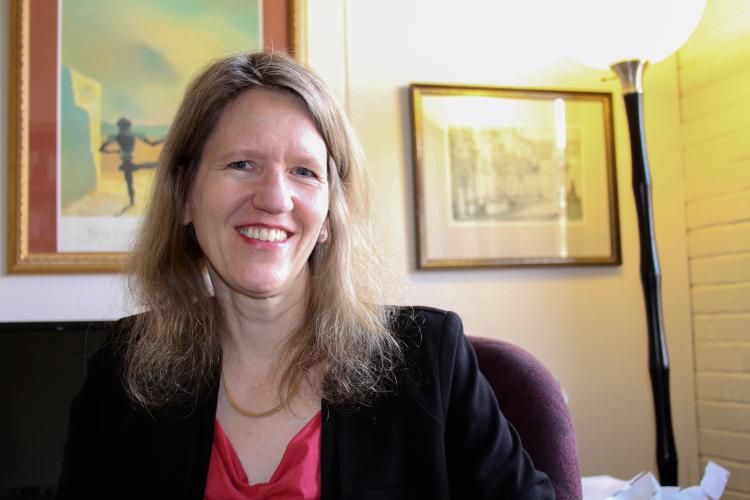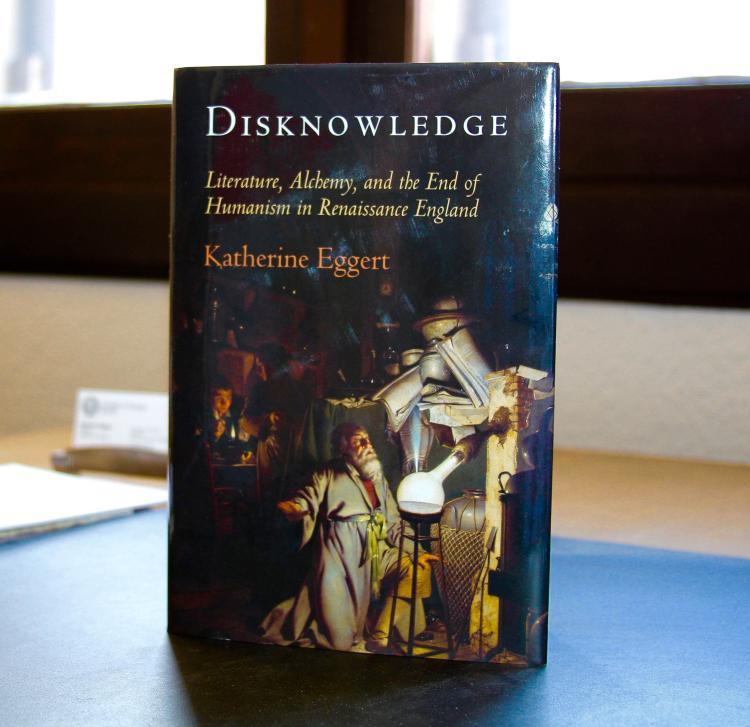CU Renaissance lit scholar coins 'disknowledge' years before 'alternative facts'
Study of 17th-century use of 'alchemical' language rings true today
Long before "alternative facts" made headlines, University of Colorado Boulder English Professor Katherine Eggert was studying late-Renaissance English writers. She focused on their use of alchemical themes, imagery and language to spurn humanism and embrace post-humanism—a belief in facts that can be proved.
By turning away from humanism, the Renaissance movement that based its idea of knowledge on the teachings and philosophies of great Greek and Roman thinkers, these writers created a new form of written fiction.
To anchor her argument, Eggert needed a term that implied "the act of consciously choosing to believe in something that isn't true," and when she determined that no English word sufficed, she invented her own word, 'disknowledge'—meaning deliberately choosing to maintain one’s belief in something a writer knows is false.

Katherine Eggert, an English professor at CU Boulder, wrote about disinformation and the renaissance in her newest book. Photo by Craig Levinsky.
Alchemy, the Oxford English Dictionary states, is "a seemingly magical process of transformation, creation, or combination." Alchemy was a serious practice in Renaissance laboratories and workshops, but others mocked it as false, foolish and a dead end.
The authors on whom Eggert focuses—William Shakespeare, John Milton, Christopher Marlowe, Margaret Cavendish, Edmund Spenser, John Donne and others—"used it to represent a moment where you believe in something that you know isn't true, but you choose to believe it anyway, which is a really useful maneuver when you need that. So, when an author 'uses' alchemy, they can use it to signify when people are thinking this way. 'Here's this thing that I know is true, but I don't want it to be true. So, I'll have some alternative belief system.' And that," said Eggert, "is when alchemy pops up."
In Disknowledge, Eggert takes aim at the alchemical treatment of three main topics written about during the Renaissance, and the fragility of commonly held beliefs about them. Each of Disknowledge's chapters navigates the changing influence of new science over conventional religion and spirituality: "how theories of matter shared their physics with Roman Catholic transubstantiation; how Christian Hermeticism depended on Jewish Kabbalah; and how new anatomical learning acknowledged women's role in human reproduction" the University of Pennsylvania Press observed.
To put it simply, Renaissance-era authors used alchemical language to bring awareness to ideas they knew to be false by treating them as if true in their writing. Such ideas were typically scientific. It might be thought of as a twist on non-realism specific to that time. "They use alchemy as a way to explore a paradigm shift that hasn't shifted yet," said Eggert, speaking of the transition in history and intellectual thought between the Renaissance and the Age of Enlightenment.
"We’re talking about the late 16th and 17th centuries," said Eggert, "in an era in which the female role in human reproduction had not been well understood. It was thought that men contributed all or at least most of the shaping process of a baby. The woman provides a seedbed. The man provides a seed. The idea was that men contributed most or all of the material to the baby that came out. But that was changing in this period, and these writers have fun with that," said Eggert.
"So, I write about William Shakespeare's play, Love's Labour's Lost, which begins with a bunch of men saying, 'Ok, we’re going to give up women. And we’re going to go into an all-male academy system, and we’ll really produce some great stuff!' And it's a comedy," Eggert explained.
"So, of course women show up, and the men can't live without them. And Shakespeare uses a ton of alchemical imagery to describe what these guys are trying to do, which is reproduce without women. They're trying to create knowledge and, of course, immortality, right? If you create knowledge you live forever. It’s another way of living forever that doesn't require women," said Eggert.
There are plenty of ways to describe a knowledge-event," said Eggert, but giving into disknowledge "is a really important way to understand how we go about life both wanting to know things and not wanting to know things. There is this weird place in people's minds where they like something that they know to be untrue to be true, and there's legitimate room for that."
"Disknowledge," therefore, is the manifestation of the denial one experiences when faced with accepting a correction to, or an entire dismissal of, a long-held belief system or understanding, and of the struggle to abandon commonly held but disproved beliefs.
Alchemy, then, is the ritual one practices, or the language one uses, while seeking to maintain a previously held but refuted understanding of something simply because it might be a comfortable and familiar position to uphold.
"England had thrown out the idea of transubstantiation," explained Eggert, "which is that the bread and wine of holy communion turned into the body and blood of Jesus Christ. Yet, even though they're Protestant, there are good reasons to want that to be true, centuries of religious tradition."
"So, alchemy often gets associated with transubstantiation because it's magically changing one substance into another substance. I write about religious poets who want to think about these crucial religious issues at the time but use alchemy instead. They don’t say, 'I'm talking about holy communion.'"
Instead, explained Eggert, they wrote alchemical poetry that incorporated questions concerning transubstantiation and of leaving Roman Catholicism.
"There are plenty of ways to describe a knowledge-event," said Eggert, but giving into disknowledge "is a really important way to understand how we go about life both wanting to know things and not wanting to know things. There is this weird place in people's minds where they like something that they know to be untrue to be true, and there's legitimate room for that."
She likened her concept to a sociological field called "ignorance studies" and to the term "strategic ignorance," citing the case of tobacco industry executives who, after reading reports of the harmful effects of nicotine, still believed that cigarettes are healthy.

'Disknowledge: Literature, Alchemy, and the End of Humanism in Renaissance England' looks to the role that alchemical themes, imagery and language played in spurning humanism. Photo by Craig Levinsky.
Eggert argues that the writers she studied in Disknowledge used alchemical language to invent a new form of written fiction as a means of ushering society from humanist to post-humanist thinking. The opposite then is also true: progressive post-humanist thinking helped to inform this new form of fiction for the time.
Authors consider their work in alchemical terms all the time, said Eggert. "They recognize literature as both true and false at the same time. And they're happy with that."
One of the most surprising things she learned while researching Disknowledge, however, was the impact of alchemical thinking on the education system.
"How do you make your society better through educating the people? The 17th century people are in this weird state. 'We've been going with this educational system for a long time. We know it's not adequate. But we're going to keep going with it because we like it.'"
Alchemical writing is formulated the same way, she said. "That is to say, we know it's not true. It's based on ancient learning that doesn't work, but we're going to use it anyway. We're talking about a historical moment of transition in thinking, in education, in what you consider to be real knowledge. Do you get your real knowledge by picking up an old volume of Pliny's natural history, and studying the classics from Greece and ancient Rome, or do you go out and do some observations and experiments? We’re in a moment where you might want to put down your book and start formulating experiments, but that's a very hard thing to do."
Shakespeare and Spenser are interested in why you would sustain a practice that doesn't do any good, and Eggert said there are many reasons to do that. "One of them is that it just gives you a mental framework for thinking about the world or thinking about yourself, and you might like that even if you never get gold or the philosopher's stone—or if you never become a spiritually better person. But you're trying," Eggert said.
"Even if you know it's not true, the trying helps."

